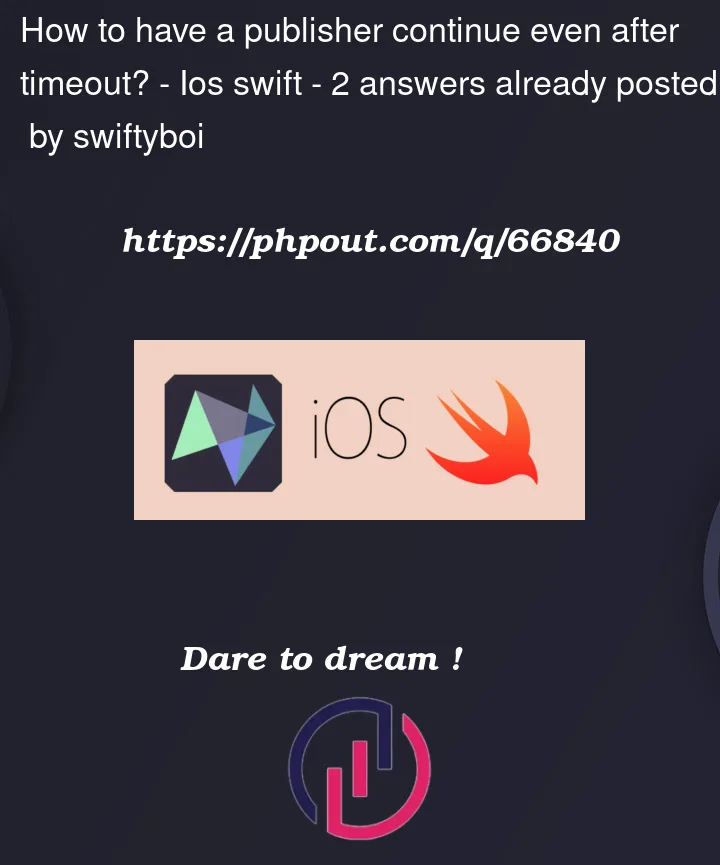So I am making multiple API calls that I need to refresh my UI. I am using CombineLatest to wait until I have data from all of them before updating the UI:
let apiCall1 = repository1.fetchData().eraseToAnyPublisher()
let apiCall2 = repository2.fetchData().eraseToAnyPublisher()
let apiCall3 = repository3.fetchData().eraseToAnyPublisher()
let apiCall4 = repository4.fetchData().eraseToAnyPublisher()
Publishers.CombineLatest4(apiCall1, apiCall2, apiCall3, apiCall4)
.sink(receiveCompletion: { [weak self] result in
switch result {
case .finished: return
case .failure(_): handleError()
}
}, receiveValue: { [weak self] result1, result2, result3, result4 in
self.saveResults(result1, result2, result3, result4)
self.updateUI()
})
.store(in: &cancellables)
Three are vital, but apiCall4 should be optional. If it takes too long, I would like to avoid waiting for it. In other words, I don’t want to block the UI until it comes in.
So I am trying to implement a stop gap timeout. Maybe return an empty array so that I can update the UI until I actually get the data.
I have played with adding a timeout to the publisher, something like this:
let apiCall4 = repository4.fetchData().eraseToAnyPublisher()
.timeout(5, scheduler: DispatchQueue.main, customError: {
return ResponseError.timeout
})
.replaceError(with: [])
But the problem, of course, is that this terminates the apiCall4 publisher. I won’t get the data if the API call completes after the timeout.
Is there any way to send a placeholder value after x amount of time without actually terminating the apiCall4 publisher?




2
Answers
My understanding is:
If
apiCall4publishes its first output before the timeout, you only want the genuine outputs fromapiCall4.If
apiCall4doesn’t publish its first output before the timeout, you want to publish a default value, but you want to allowapiCall4to continue running, and use its output if it eventually publishes anything.Here’s one way to solve this.
We’ll use a
Justwith adelayto publish the default output after the timeout.We’ll use
mapto tag the default output and the genuine outputs, so we can distinguish them downstream.We’ll use
mergeto combine the tagged outputs ofapiCall4and the delayedJustinto a single stream.We’ll then use
scanto keep some state about whether we’ve ever seen a genuine output, so if we get the default output after seeing a genuine output, we can discard the default output.Since
scanpublishes its entire state, and always publishes when its upstream publishes, we can’t actually discard the default output inscan, nor can we publish just the output without the extra state. So we’ll usecompactMapafterscanto strip offscans extra state and actually discard if we get the default output after a genuine output.Here’s the type we’ll use to tag each output with its genuine-ness:
And here’s the type we’ll use to hold the extra
scanstate:And here’s how we assemble the pieces, as described above:
Here’s a test function:
The timeout is one second. If I run a test with
apiCall4publishing after 900 milliseconds, I only see the genuine output:If I run a test with
apiCall4publishing after 1100 milliseconds, I see the default output followed by the genuine output:The answer is simple, just
prependan empty array to apiCall4. The UI will update when the other three values emit along with the empty array for apiCall4, then when apiCall4 comes in, the UI will update again with the additional, optional, information.No need for a timeout at all.
The best part about using prepend is that the UI will update as soon as the other three calls emit values. If apiCall4 has already emitted by then, the default won’t show, if not, then it will.
Update
I didn’t know you want to force the user to wait 5 seconds… Here is a simple solution for that:
The
amboperator will take from whichever publisher emits first. The second publisher (Just([]).delay...) will emit after 5 seconds.